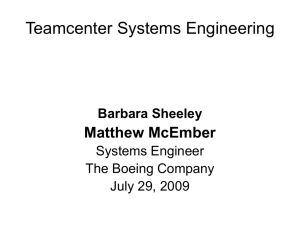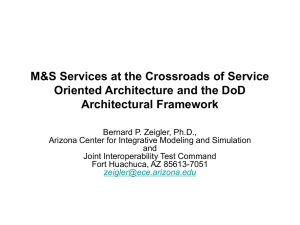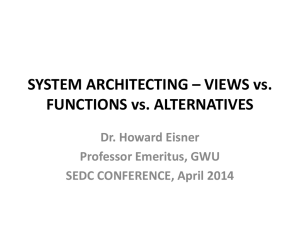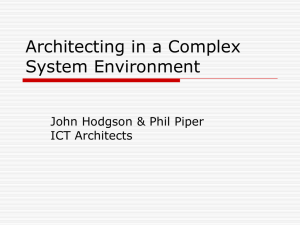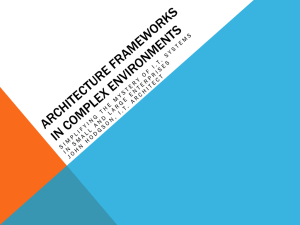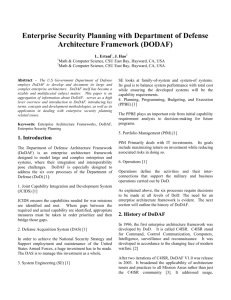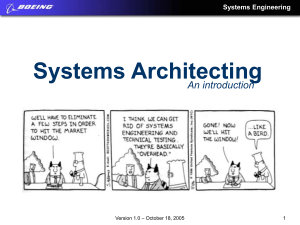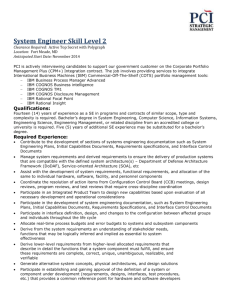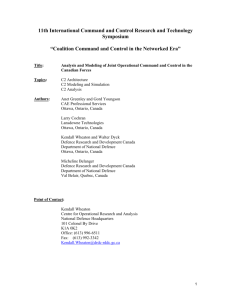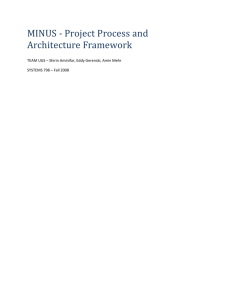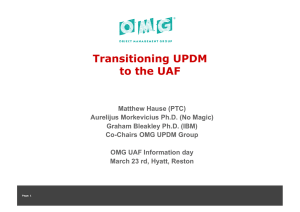Use of DoDAF for Systems Integration
advertisement
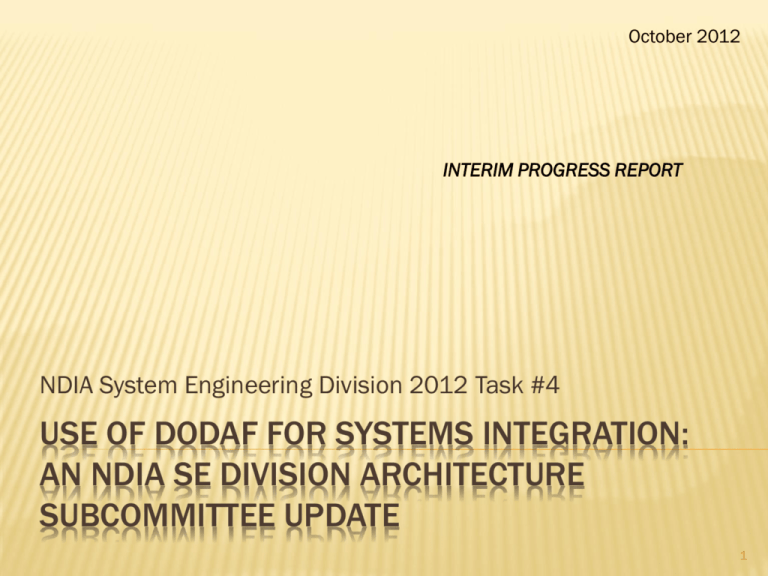
October 2012 INTERIM PROGRESS REPORT NDIA System Engineering Division 2012 Task #4 USE OF DODAF FOR SYSTEMS INTEGRATION: AN NDIA SE DIVISION ARCHITECTURE SUBCOMMITTEE UPDATE 1 OVERVIEW Tasking Statement Architecture Subcommittee Members DoDAF Background Findings to Date Audience Input Next Steps 2 TASKING STATEMENT Questions posed by the SE Committee to the Architecture Subcommittee Is the use of authoritative DoDAF-like architectures critical for a successful systems integration effort? (Navy). Does the DoDAF provide reusable architectures, environments and system hierarchies? (AF) 3 TASKING ANALYSIS Input from Steve Henry (Chair, SE Committee): Input from John Palmer (Co-chair, SoS Committee): “The Navy is concerned about Enterprise integration across their mission threads.” “..what level of architecture is needed to ensure successful integration.” (Navy) “Air Force interested in architecture reuse to save cost” “USAF wants to be able to re-use architecture models, and be able to link the models developed among different technical disciplines” “… architecture tools to better support sustainment issues” “The Navy was questioning the effective value of the DoDAF … and asking for better ways” Input from John Lohse (Chair, M&S Committee): Navy “stated the DoDAF artifacts don't allow for things to change over time.” Navy “also addressed the desire to tie them to the Navy NMETLs and UJTLs.” Navy “requested some help in understanding the role of mission advocates and platform advocates in Development Planning” 4 ARCHITECTURE SUBCOMMITTEE MEMBERS WORKING THIS TASK Barbara Sheeley, The Boeing Company (Subcommittee Chair) Dr. Steven Dam, SPEC Innovations Jack Zavin, OSD/USD (AT&L) Fatma Dandashi, MITRE Ron Williamson, Raytheon Bruce Brown, Northrop Grumman John Palmer, The Boeing Company Kevin Agee, Army Research Laboratory Dave McDaniel, Silver Bullet Solutions Raschid Muller, DISA 5 DODAF BACKGROUND From presentation to NDIA SED Architecture Committee, May 18, 2012 by Mr. Walt Okon, Senior Architect Engineer in charge of DoDAF, Architecture & Interoperability Directorate, DoD CIO 6 Perceived Benefits of DoDAF Common vocabulary, semantics and viewpoints Support for JCIDS Emphasis on architecture related DOTMLPF concerns operational/business concerns standards operational and system structure/behavior data and information traceability among viewpoints 7 Perceived Limitations of DoDAF Relation between DoDAF and SE unclear Use case and requirements support missing Framework, not a methodology Data model still very complex at PES level Lack of metrics No DoDAF certification process for training courses No executable architecture support Limited tool integration support Large number of views No predefined templates No common sub-domain viewpoints No emphasis on quality attributes 8 Initial Observations Significant user resistance to DoDAF continues Architectures often being developed to meet requirement, then ignored Data-centric approach may miss key part of design: form, fit, and function Visualization now a major issue – “fit-for-purpose” may lead to lack of standardization making comparisons more difficult Moving to single coalition architecture framework has pros and cons Many Architects do not consider themselves as doing systems engineering – following potentially duplicative paths This is the focus of our recommendation paper 9 ARCHITECTURE & SYSTEMS ENGINEERING (SE) INITIAL THOUGHTS ON SE SE 101 from INCOSE Manage Complexity, Reduce Risk (Cost, Schedule, Technical) Big Picture and Common Sense Successful SE Features Understand the Problem Assess Alternatives Define System Architecture Manage Requirements Manage Interfaces Prepare Test, Training and Support Capabilities Track Progress Against Plan 10 Source: INCOSE Transportation Working Group www.incose.org/practice/techactivities/wg/transport DODAF & SYSTEMS ENGINEERING INITIAL THOUGHTS ON DODAF VALUE TO SE Understand the Problem Define System Architecture DoDAF Systems, Services, Data/Information, Standards Viewpoints address the solution domain (current & objective) Manage Interfaces Who, What, Where, When, Why, How…Common Vocabulary DoDAF Capability and Operational Viewpoints address the problem domain needs (current & objective) DoDAF core Systems and Services views focus on interfaces, flows and traceability to Operational Needs Track Progress Against Plan DoDAF AV-1 defines the architecture plan and should be integrated with the SEMP (Systems Engineering Management Plan) 11 Audience Input Your DoDAF experience? Recommendations? Next Steps Continue to gather information about DoDAF’s use today Deliver a recommendations report to SE Committee Long-term: develop a survey to obtain quantitative data on use and usability of DoDAF in architecture and SE development 13
